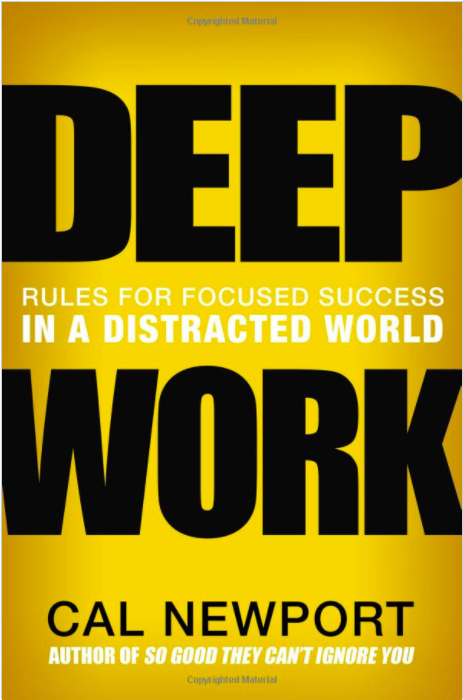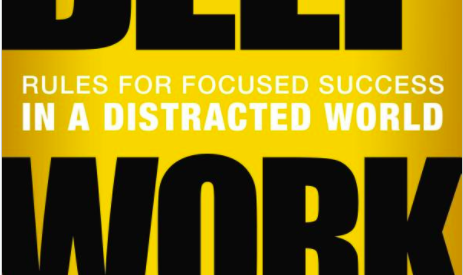 Deep Work by Cal Newport, published January 2016
Deep Work by Cal Newport, published January 2016
Cal Newport might change your life.
In my case, he shifted how I should think about my career after I read So Good They Can?t Ignore You. I read the book while I was changing fields ? leaving the Army to become a writer ? after finding it on Derek Sivers? book notes site. It was perfect timing.
I knew Deep Work would be just as good, if not better. And it was.
[sign up for my words in your inbox right here]
My ?to finish? roster has an avalanche of projects ranging from the artistic (screenplays, stage plays and personal essays) to the entrepreneurial (so. many. business. ideas!). I feel like I?m drowning under the things I want to do versus the time I have to do them. Not to mention, all the life-supporting drudgery that must get done like laundry, working, cleaning out the fridge, bathing and occasionally having a social life.
I knew I needed a system to get myself in the right state of mind to consistently create.
And, I needed a kick in the pants to keep my work train rolling. If I don?t get these occasional wakeup calls, it?s so easy for me to fall into the trap of reading about other writers and creators who are doing the thing I want to do, rather than just putting in the minutes and hours doing it myself.
Newport gives a number of tips that helps you create time and space for getting in the flow state. These are the ones I found most salient.
1. Distance yourself from social media.
Cull the Twitters, Instagrams, Facebooks of your social media life by ruthlessly discarding any site that doesn?t inherently contribute to a quality life.
Newport?s argument in this realm is that we?ve fallen for the ?any-benefit approach.? This is when we think we?re ?justified in using a network tool if [we] can identify any possible benefit to its use, or anything [we] might miss out on if [we] don?t use it.?
This is the ?why not??approach, where we adopt Facebook or Instagram because hey, it?s there and family or friends have bugged us to join them on the network.
The one benefit (connecting with family and friends) can come at the expense of the many downsides that same tool might have. Newport argues that we don?t use that approach with our physical tools so why do we give our digital ones such any easy and all-encompassing path into our lives?
After I read this chapter, I took a bath, left my phone and laptop sitting on my couch, and luxuriously lolled about letting myself pick apart some story ideas without any Googling to verify this or that fact. I went to bed, devices still safely tucked into the couch pillows, and slept for nine hours.
When I woke up, the same story points I had started pulling apart while soaking in Epsom salts came back, and I spent a solid 45 minutes going deeper while staring at my ceiling fan. I didn?t have my phone to pull me into the day?s news via my Twitter feed, email inbox, or text message queue. That 45 minutes felt like three hours of solid thinking. It was amazing. I call it the Cal Newport Effect.
2. Give yourself a strict period of time to spend working. This limits burnout, work creep, and keeps you focused and urgent on your work.
Newport uses examples in his own life as well as Radhika Nagpal from Harvard University, and Adam Grant from Give and Take and University of Pennsylvania fame to demonstrate that you can produce ? quality and quantities of work ? working a 9?5 with no weekend work.
He calls this fixed-schedule productivity. If you?ve read The 4-Hour Work Week by Tim Ferriss you?ll find many of the principles the same. For my military folks, it?s using backwards planning to schedule your day.
The more you give yourself limits, the less time you have for wool gathering as you dither between a newsletter, your Facebook feed, and The New York Times (or in my case, The New Yorker?s Daily Shouts archives).
[speaking of newsletters?sign up for mine here]
False urgency is hard to manufacture, but if you give yourself goals and deadlines, such as I have 90 minutes to finish this article or, I start winding down work at 6:15 pm every day, you can keep yourself on task easier.
Newport doesn?t work after 5:30 pm and only rarely on weekends. He?s a computer science professor as well as an author, and contributes multiple academic papers each year. This principle works for businesses too: 37Signals found that more work got done when timelines where compressed and employees had more days off than the normal 5/2 work week.
3. Use commutes, exercise, cleaning or other repetitive tasks to work out concepts.
Not all of us work on solving computer science algorithm problems like Newport, but this technique can translate across most disciplines.
Novelists can work on a plot points and musicians can work out a tricky fingering section mentally. Writers can figure out dialogue for the key climax scene and teachers can conceptualize a lesson plan.
Instead of zoning out to Mark Maron?s podcast, flicking through the radio, or zoning out to your third viewing of Game of Thrones, you can train your mind to use trapped time to work on the knotty sections of your deep work.
I think of it as picking at a tangle of hair instead of saving it for when you have time.
4. Prioritize with the 4DX Framework
Remember the Eisenhower Matrix? Urgent-important vs urgent-less important, etc? The 4DX framework was developed by business consultants and discussed in The 4 Disciplines of Execution, and to me, it echoes the spirit of the Eisenhower quadrant.
Newport adapted 4DX to support deep work:
- Focus on the wildly important. This means a small number of extremely essential goals. For writers, it?s writing that thing you?ve been noodling on for months, maybe even years. It?s cutting out the busywork of say, applying to residencies, writing Tweets, tweaking your website, searching for the perfect combat boots on Zappos ? any of the small gophers that pop up. Instead of constructing your house, you?re picking weeds in the patch where you should be pouring concrete.
- Act on lead measures. As the saying goes, ?what gets measured gets managed.? Two metrics are used: lag measures and lead measures. For deep work, the lead measure ?is time spent in a state of deep work dedicated toward your wildly important goal.? Lag measures describe your output, such as the number of screenplays you completed, songs you composed, or recipes you developed.
- Keep a compelling scoreboard. This means a visible tracking system to keep yourself honest about how much time you?re spending on your priority project. It can be as simple as a sticky note on your laptop.
- Create a cadence of accountability. To keep yourself moving toward your goals, you have to review your progress regularly. That could mean a weekly review, monthly review, and quarterly review where you see how much you?ve accomplished and make a plan for the upcoming weeks.
5. Notice Your Shallow Work to Better Avoid It
Checking email, filling in a spreadsheet, responding to a general request in Slack, tweaking the monthly slide update ? these are all examples of shallow work.
Specifically, it?s ?noncognitively demanding, logistical-style tasks, often performed while distracted. These efforts tend not to create much new value in the world and are easy to replicate.?
These are the tasks that feel SO NICE to get out of the way, but at the end of the day, mean little. You essentially shuffled some papers instead of laying bricks to build a house.
Newport says the trick to knowing what tasks are shallow versus deep is measuring in months how long it would take to train a smart college grad to complete it. This helps clear some ambiguity over tasks that may be important (filing a certain report) but not deep.
While most jobs require plenty of shallow work, you should try to minimize and contain it as much as possible. For me, that means in my creative life I need to stop spending so much time looking up places to submit my writing and spend much more time actually writing.
While I?m far from implementing all the life and work habit changes recommended by Newport, the ones I have adopted have already boosted my output.
And beyond that, I feel better when I spend more time in the zone. Any time spent in a flow state feels amazing. Time stops. Things get accomplished. It?s the getting started that?s the hardest. Luckily, Newport gives plenty of ideas to get you started on building it into your daily life.
Find more practical tips in my next review: 5 Lifelong Lessons from The Magic of Thinking Big by David Schwartz.
I also wrote about Cal Newport?s newest book, Digital Minimalism.
Have a book you?d like me to review so you can get the essential takeaways? Send me a note! Connecting with a fellow personal development nerd will make my day.
Get my book reviews and more directly in your inbox.

? Read this story later in Journal.
? Wake up every Sunday morning to the week?s most noteworthy Tech stories, opinions, and news waiting in your inbox: Get the noteworthy newsletter >


